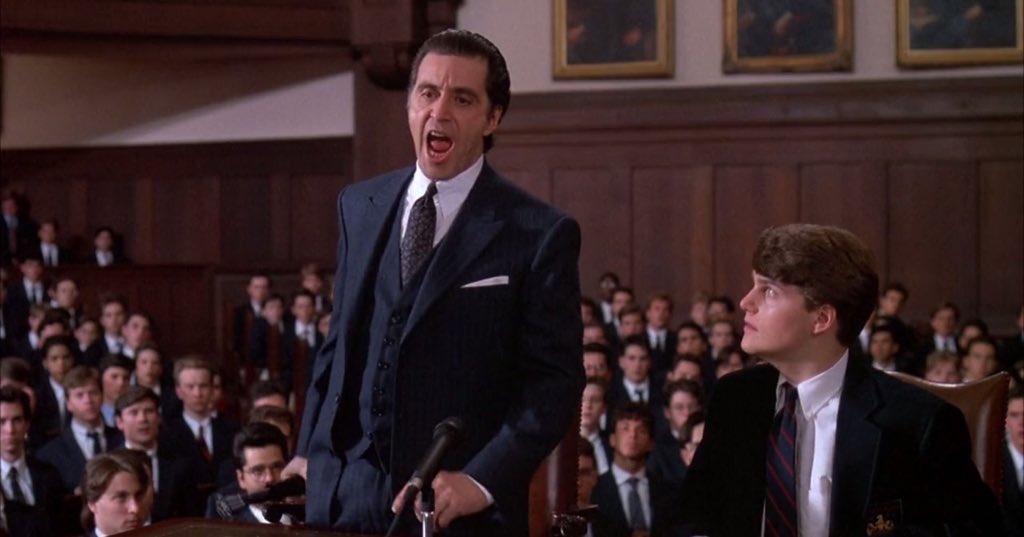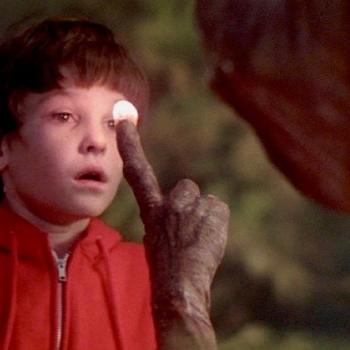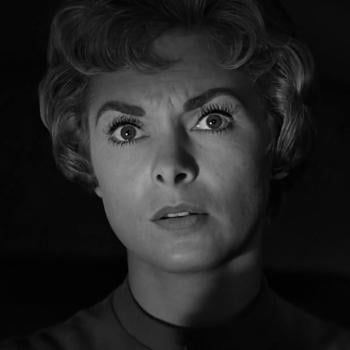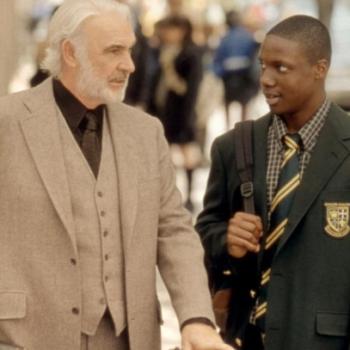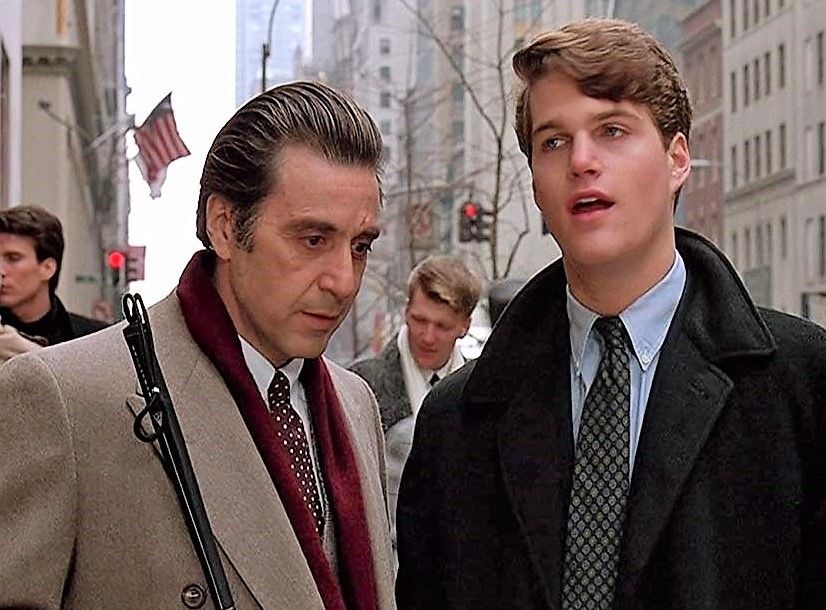
There are a lot of things about Martin Brest’s 1992 film, Scent of a Woman, that fascinate me. For one thing, it clocks in at over 2 and a half hours. Where most movies that reach that runtime are some kind of action-adventure epic, this movie is carried almost exclusively by a single relationship, that of mild-mannered 17 year-old Charlie Simms and Lt. Colonel Frank Slade, the cantankerous, blind war veteran Charlie is tasked with watching over Thanksgiving weekend.
Charlie comes across Slade as he is facing a moral dilemma. Charlie is pressured by his boarding school’s headmaster to give the names of three students who humiliated him with a cheap prank. If Charlie complies, his headmaster promises to fast-track him to Harvard. It’s an appealing offer to Charlie, who attends his prestigious boarding school on scholarship, unlike his wealthy fellow students. But is a letter of recommendation worth Charlie selling out over his headmaster’s bruised ego? The implications of his decision weigh over Charlie as he is charged with watching Colonel Slade.
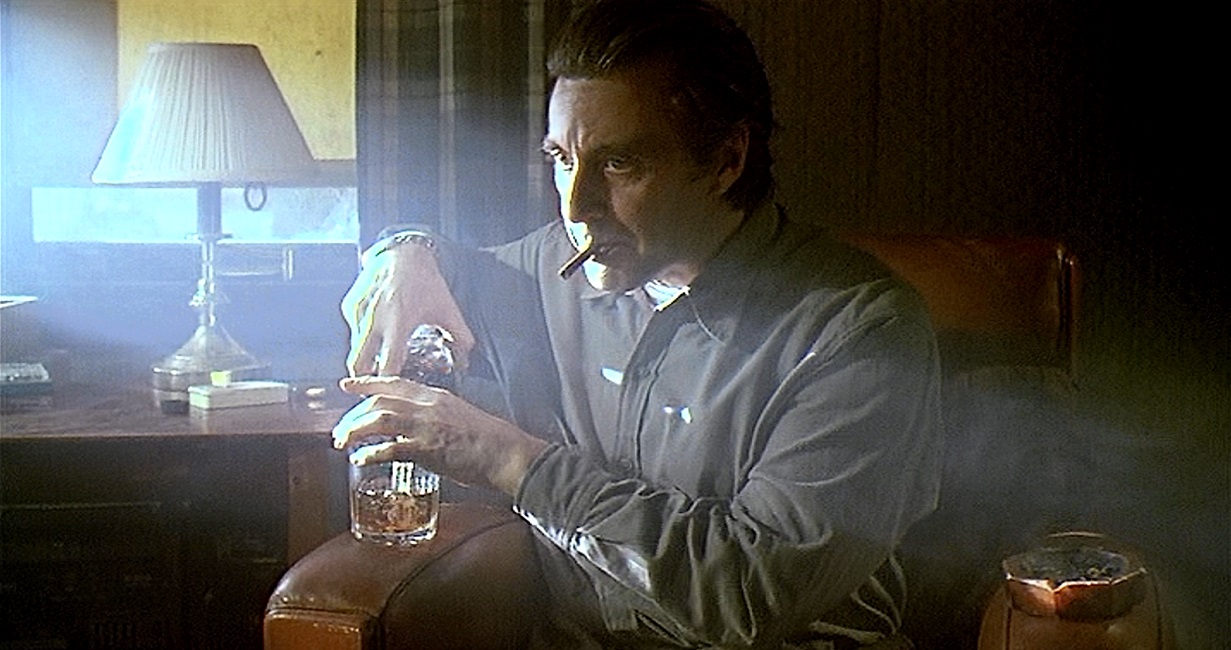
The film plays a fine balancing act with Slade. He is coarse yet refined. Incisive yet brutish. Slade calls Charlie an idiot and a moron within his first minute of meeting him. You get the idea that there’s no way Charlie could ever placate Slade, let alone impress him.
Slade’s indecency also covers a wide swath of disreputable behaviors that isolate him from society, even family members. He occasionally makes blithe comments about women and various disadvantaged groups. The film’s title comes from a monologue where Slade describes in some detail the sexual parts of a woman’s body. This part of Slade’s personality isn’t necessarily celebrated, it’s mostly played as a quirk of Slade’s that Charlie and others have to put up with. (Still, it’s fair to wonder whether these comments might have been more overtly condemned within the text, if they had been included to begin with, had the film been made later.)

In some ways, this crudeness is intentional on part of the film, and accounted for. The film challenges you to empathize with someone so willfully spiteful as Slade, to discover some context that excuses his brutish behavior. And it poses the possibility that maybe there just isn’t any. At one point, Slade’s nephew disdainfully remarks, “The truth is he’s always been an a**hole. Now he’s just a blind a**hole.” (That’s his nephew Slade is choking in the picture above.) But it takes a person like Charlie to look past the vulgarity and see Slade as a whole person.
Charlie recognizes that Slade is a man displaced. Once a respected war hero, Slade’s volatility is a token of the resentment he feels toward being made to feel helpless. This contextualizes a lot of the nihilism that motivates Slade’s crass behavior and challenges Charlie’s sincere but untested sense of morality. Through their time together, Charlie helps Slade see that he still has much to look forward to and live for. (One of the film’s most memorable sequences has Slade perform a lively tango with a young woman while waiting for their dinner.) Meanwhile, Slade proves the unexpected hand on Charlie’s shoulder as he faces a decision that will determine not only his academic future but also the trajectory of his moral character.

The thing that drew me to writing about this film through this venue comes back to that challenge the film issues with Slade’s character: does a jerk like Slade deserve our respect or empathy? The modern discourse puts a lot of stock in the notion that some people are just inexcusably vile and therefore deserving of our disdain. It’s easy to see where this mindset comes from, but I frequently question whether this is behavior that Christ expects of people who claim to follow his teachings. That’s why we need stories like this to remind us occasionally that we’d do better to understand “a**holes” like Slade than tear them down. Who knows? These people may even come to become our greatest allies.
Something I find especially interesting, especially on rewatches, is the way that Charlie is not expected to take on more brutish characteristics himself in order to earn the respect of Slade or the audience. Charlie doesn’t have to rise to meet Slade’s rudeness to “grow up” or anything. He’s still a clean, wide-eyed gentleman whose speaking voice never registers above a polite whisper. And it’s a venerating, satisfying, deeply moving moment when Slade’s signature barking gives way to an impassioned defense of Charlie’s character in front of the entire student body and faculty. One of the reasons why movies like this are so powerful is that they affirm that true goodness, like that which Charlie extends to Slade, can bring out the best even in someone as prickly and uninviting as Slade.
Tearing people down can be fun, sure. But enveloping them in Christlike love, even when no one else would? That’s in a class of its own.
